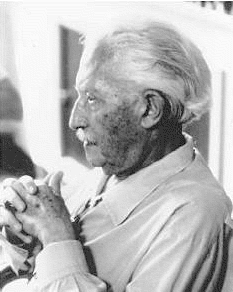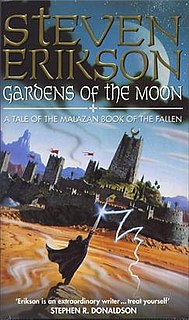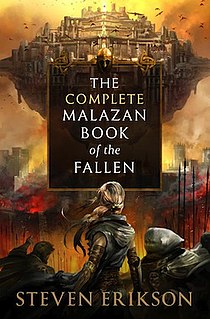
Leif Erikson, Leiv Eiriksson or Leif Ericson was a Norse explorer from Iceland. He was the first known European to have set foot on continental North America, before Christopher Columbus. According to the Sagas of Icelanders, he established a Norse settlement at Vinland, tentatively identified with the Norse L'Anse aux Meadows on the northern tip of Newfoundland in modern-day Canada. Later archaeological evidence suggests that Vinland may have been the areas around the Gulf of St. Lawrence and that the L'Anse aux Meadows site was a ship repair station.
A young adult is generally a person ranging in age from their late teens or early twenties to their thirties, although definitions and opinions, such as Erik Erikson's stages of human development, vary. The young adult stage in human development precedes middle adulthood. A person in the middle adulthood stage ages from 40 or 41 to 64.

Erik Homburger Erikson was a German-American developmental psychologist and psychoanalyst known for his theory on psychological development of human beings. He may be most famous for coining the phrase identity crisis. His son, Kai T. Erikson, is a noted American sociologist.

Steven Erikson is the pseudonym of Steve Rune Lundin, a Canadian novelist, who was educated and trained as both an archaeologist and anthropologist.

Erikson's stages of psychosocial development, as articulated in the second half of the 20th century by Erik Erikson in collaboration with Joan Erikson, is a comprehensive psychoanalytic theory that identifies a series of eight stages that a healthy developing individual should pass through from infancy to late adulthood.

Gardens of the Moon is the first of ten novels in Canadian author Steven Erikson's high fantasy series the Malazan Book of the Fallen. It was first published in 1999 and was nominated for a World Fantasy Award.

Malazan Book of the Fallen is a high fantasy book series by the Canadian author Steven Erikson. The series, published by Bantam Books in the U.K. and Tor Books in the U.S., consists of ten volumes, beginning with Gardens of the Moon (1999) and concluding with The Crippled God (2011). Erikson's series is extremely complex with a wide scope, and presents the narratives of a large cast of characters spanning thousands of years across multiple continents. His plotting presents a complicated series of events in the world upon which the Malazan Empire is located. Each of the first five novels is relatively self-contained, in that each resolves its respective primary conflict; but many underlying characters and events are interwoven throughout the works of the series, binding it together.
A midlife crisis is a transition of identity and self-confidence that can occur in middle-aged individuals, typically 45-55 years old. The phenomenon is described as a psychological crisis brought about by events that highlight a person's growing age, inevitable mortality, and possibly shortcomings of accomplishments in life. This may produce feelings of intense depression, remorse, and high levels of anxiety, or the desire to achieve youthfulness or make drastic changes to their current lifestyle or feel the wish to change past decisions and events.
Middle age is the period of age beyond young adulthood but before the onset of old age.
Ian Cameron Esslemont is a Canadian writer. He was trained and has worked as an archaeologist. He is best known for his series Novels of the Malazan Empire, which is set in the same world as the Malazan Book of the Fallen epic fantasy series written by his friend and collaborator, Steven Erikson. Esslemont is the co-creator of the Malazan world.
In psychology, identity crisis is the failure to achieve ego identity during adolescence. The term was coined by German psychologist Erik Erikson.

Passat is a German four-masted steel barque and one of the Flying P-Liners, the famous sailing ships of the German shipping company F. Laeisz. She is one of the last surviving windjammers.

Douglas Elwin "Duke" Erikson is an American musician, songwriter, screenwriter, film producer and record producer, best known as a co-founder and guitarist in the alternative rock band Garbage. Garbage has sold more than 17 million albums worldwide.

Leif Erikson Day is an annual observance that occurs on October 9. It honors Leif Erikson, the Norse explorer who led the first Europeans thought to have set foot in continental North America.
Tom Erikson is an American former amateur wrestler and mixed martial artist who competed in the super heavyweight division. Weighing between 127.1 kg and 139.8 kg throughout his career, "The Big Cat" began wrestling at an early age and was twice National Junior College Athletic Association (NJCAA) Junior Collegiate Champion at Triton College before achieving National Collegiate Athletic Association (NCAA) Division I honors twice at Oklahoma State University–Stillwater. He embarked on his career in MMA in 1996 and went on to fight in the Pride Fighting Championships, being a founding member of the prestigious RAW team.
Erikson Institute is a graduate school in child development in downtown Chicago, Illinois. It is named for the noted psychoanalyst and developmental psychologist, Erik Erikson.
Kai Theodor Erikson is an American sociologist, noted as an authority on the social consequences of catastrophic events. He served as the 76th president of the American Sociological Association.

Forge of Darkness is the first novel of The Kharkanas Trilogy by Canadian author Steven Erikson, set before the events of the Malazan Book of the Fallen.
The Kharkanas Trilogy is an epic fantasy series by the Canadian writer Steven Erikson. The series consists of three novels, two of which—Forge of Darkness and Fall of Light—have been published as of 2019. The series serves as a prequel to Erikson's Malazan Book of the Fallen series, and tells the story of the Tiste, Jaghut and Azathanai, three hundred thousand years before the Malazan Empire began its conquest on Genabackis, with a focus on characters such as Anomander Rake, Draconus, Hood, Gothos and K'rul. The series draws inspiration from the Shakespearean declamation style, and is framed as being told by one poet to another. It was received positively by critics as well as readers.
Neil Erikson is an Australian far-right extremist, founding member of the United Patriots Front (UPF). Erikson is a neo-Nazi and convicted criminal whose convictions include assault, inciting contempt against Muslims, stalking, making threats to prevent a clergyman discharging duties and disturbing religious worship, affray and riotous behaviour. Along with fellow UPF members Chris Shortis and Blair Cottrell, he was associated with the secretive far-right "fight club", Lads Society. The UPF has now been renamed Lads Society.









